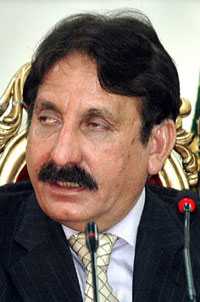 [ADN Kronos] The militant cleric Sufi Mohammed has been arrested and transferred to a secret 'safehouse' in Peshawar, together with his wife, an unnamed official told Adnkronos International.
[ADN Kronos] The militant cleric Sufi Mohammed has been arrested and transferred to a secret 'safehouse' in Peshawar, together with his wife, an unnamed official told Adnkronos International. Tomorrow we'll likely have a story saying he wasn't arrested, never happened, nope...
Mohammed brokered a controversial peace deal earlier this year between the government and militants in the troubled northwest Swat valley.
He took the interesting position that it was his job to negotiate the agreement, but that somebody else was responsible for enforcing it. He didn't say who.
The arrests were made recently and the government was aiming to keep them secret until it decides on role for Mohammed, according to the source, who is close to developments in surrounding North West Frontier Province. "This could be the beginning of a new round of a dialogue as the military operation so far failed to get the government any place," the source told AKI, speaking on condition of anonymity.
Toldja they'd surrender as soon as they'd beaten the Talibs in the field.
The government in April launched a military offensive against militants in the Swat valley and surrounding areas, who are fighting to impose hardline Islamic or Sharia law there under the peace accord they signed in February.
That was after they broke the agreement that Sufi wasn't responsible for enforcing...
Mohammed is the head of militant group Tehreek-e-Nafaz-e-Shariat-e-Mohammadi and is the father-in-law of the Taliban leader in Swat, Maulana Fazlullah. Mohammed has been calling for an end to the military operation and has threatened to abandon the Swat peace deal.
It looks like the Swat peace deal has pretty thoroughly flown that coop...
Over 3.5 million people have been taken refuge in camps since the operation started in Swat and the government is poised to open up a new front in South Waziristan bordering Afghanistan, which is likely to bring a new wave of refugees.
All thanks to Sufi Mohammad...
South Waziristan is the stronghold of Pakistani Taliban leader Baitullah Mehsud and the military operation there is seen as a potential turning point in the fight against militancy in Pakistan. A rival of Mehsud, Qari Turkestan Bhitaini, has confirmed CIA and Pakistani government reports he was behind the assassination in December, 2007, of former prime minister, Benazir Bhutto.
The Mighty Pak Army doesn't appear to be out to kill Qari, and the government doesn't appear to be too concerned about him imposing his writ on the locals...
Bhitaini said he can supply the addresses of the suicide bombers who were sent by Baitullah to kill Bhutto. " Baitullah Mehsud is an American, Indian and Jewish Agent.
That makes sense. Not a lot of sense, but sense. Kind of. In an Islamic sort of way...
He receives dollars from the Indian embassy in Afghanistan to attack the Indian security forces
They pay him to attack them... In Pakistain that passes for subtlety...
and has continued to defy the directives of the commander of faithful Mullah Mohammad Omar (Afghan Taliban leader) to go to Afghanistan along with his fighters and fight against the infidel NATO forces," Bhitaini said in an interview with Pakistan's Express TV Channel.
We actually had that report yesterday. Must-see viewing.
Although Bhitni and fellow warlord and Mehsud rival Qari Zain Mehsud are seen as key to government strategy in South Waziristan, their combined force does not exceed 3,000 fighters. Two prominent Mehsud rivals, Hafiz Gul Bahadur, Taliban chief in the neighbouring North Waziristan tribal area, and Mullah Nazir, local Taliban chief in South Waziristan's main town of Wana have decided to remain neutral in the conflict.
Such actions make sense only if the government of Pakistain regards them as resources...
A top Taliban commander in the region and Pashtun warlord, Sirajuddin Haqqani, is also likely remain neutral. Haqqani, who leads Taliban militants in the Afghan provinces of Paktika and Khost, is considered to be very close to Pakistani security forces.
But make sure you don't use Afghanistan as a base for attacks on Pakistain.

 [ADN Kronos] The Pakistani government has rejected reports that the militant leader
[ADN Kronos] The Pakistani government has rejected reports that the militant leader  [Bangla Daily Star] At least 70 militants were killed by the security forces while nearly 450 terrorists were holed up in Buner area, Pakistan's interior ministry chief Rehman Malik said yesterday, adding "we will not tolerate them anymore."
[Bangla Daily Star] At least 70 militants were killed by the security forces while nearly 450 terrorists were holed up in Buner area, Pakistan's interior ministry chief Rehman Malik said yesterday, adding "we will not tolerate them anymore." When Chief Justice Iftikhar Chaudhary walks into his office at the Supreme Court on Tuesday after a gap of 16 months, he has to contend with the troubling reality that his court has no writ in seven whole districts of the North West Frontier Province, including Swat.
When Chief Justice Iftikhar Chaudhary walks into his office at the Supreme Court on Tuesday after a gap of 16 months, he has to contend with the troubling reality that his court has no writ in seven whole districts of the North West Frontier Province, including Swat.